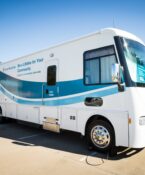President Scott Ransom responds to Virginia Tech tragedy
Students, Faculty and Staff,
We all watched the tragic events unfold at Virginia Polytechnic University this week with a sense of disbelief at the senseless violence and loss of lives. I want to assure you that the UNT Health Science Center sent its condolences to both Virginia Tech and to the nearby Virginia College of Osteopathic Medicine. We mourn with the students, faculty, staff and families who are enduring the pain and struggling to understand this unimaginable tragedy.
While no one wants to consider that such an act could be inflicted on our campus, we are a state institution with a campus that is open to the public. It is possible that a disturbed individual could threaten our health or safety at any time.
Rest assured that our highly trained Campus Police patrol regularly and will respond to emergency situations quickly and professionally. The Campus Police are in close contact with other law enforcement agencies that can offer additional support, if needed.
Our Emergency Preparedness Plan is currently being updated. It is important that you familiarize yourself with this plan, and remember these key actions in case of an emergency or terrorist act:
- Evacuate the area if you can safely do so.
- Call Campus Police at ext. 2600, or 817-735-2600 from a cell phone, to report suspicious activity or violence. DO NOT CALL 9-1-1.
- Move to an area where you can close and lock the door, if necessary.
- There are more than 20 emergency telephones located across the campus. Emergency phones are located in all elevators, as well as most parking lots and garages. Once the talk button has been pushed, or the handset has been picked up, the caller can speak directly with a police dispatcher.
- State law prohibits the possession of firearms in any building on the campus. This prohibition includes those persons normally licensed to carry a concealed weapon. Violations of state law or university policy will result in immediate action; including arrest and prosecution, referral to Student Affairs, and or disciplinary action for faculty and staff. Possession of explosives is prohibited anywhere on campus.
- Rapid and reliable communication is critical to managing crises. In case of emergency, a campus-wide e-mail message may be sent to all users; the fire alarm intercom system may be used; and patrol officers may use the public address system on their vehicles. We also will establish a command center to handle campus communications, as well as the flow of information to the public.
Additional emergency guidelines and information are available at the UNTHSC Police Department.
Dr. Scott Ransom
President
University of North Texas Health Science Center

![Uyen Sa Nguyen Scaled[58]](https://www.unthsc.edu/newsroom/wp-content/uploads/sites/16/Uyen-Sa-Nguyen-scaled58-145x175.jpg)



Social media